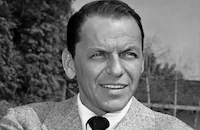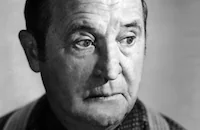Double Dynamite

Brief Synopsis
Cast & Crew
Irving Cummings
Jane Russell
Groucho Marx
Frank Sinatra
Don Mcguire
Howard Freeman
Film Details
Technical Specs

Synopsis
Two days before Christmas, after his boss, J. L. McKissack, refuses his request for a raise, Fidelity Trust bank teller Johnny Dalton argues over lunch with his longtime girl friend, Mildred Goodhew, about their marriage plans. Mildred, who is also a teller, is tired of waiting, but Johnny insists he cannot marry until he is making more money. When waiter Emil Keck urges the conservative Johnny to "live dangerously," a frustrated Mildred applauds the advice and storms out of the restaurant. Moments later, as Johnny is returning to the bank, he sees two thugs beating up a third man and comes to the rescue. The beating victim, Hot Horse Harris, is so grateful to Johnny that he takes him to his betting parlor in the back of a shirt store and gives him a $1,000 bill. Johnny protests the gift, but before he can reject the money, Hot Horse bets it on a horse race. Johnny wins $5,000, then impulsively allows Hot Horse to bet the whole amount on another race. That bet also pays off, and before long, Johnny has accumulated $60,000 in winnings, $40,000 of which Hot Horse pays him immediately. The now-flush Johnny rushes to see Emil, who assumes that Johnny took his advice and turned to crime. Emil nevertheless helps Johnny buy a car and mink coat for Mildred. At the bank, meanwhile, a still angry Mildred accepts a date from Bob Pulsifer, the bank president's playboy son. When Johnny finally returns to work, he finds McKissack informing the bank staff about a $75,000 embezzlement, which bond detectives are already investigating. Fearing that he will be implicated, Johnny leaves in a panic and takes Emil to the shirt shop to collect his remaining $20,000. To his dismay, the bookmaking operation has disappeared, adding to Emil's doubts. The two then go to Johnny's apartment, which is separated from Mildred's by a thin wall. Overhearing the delivery of Mildred's mink coat, Johnny and Emil dismantle a door that connects the two apartments, and as Mildred is showering, Johnny slips in and removes the coat from its Christmas box. He and Emil then try to stuff the money into Johnny's shower head, but succeed only in flooding the apartment. After the apartment manager informs Johnny that a detective has been asking questions about him, Emil offers to deposit the money under his name in an out-of-the-way bank. Mildred, meanwhile, has gotten drunk during her date with Bob, and while he is dropping her off, he finds the discarded fur coat tag on her floor and becomes suspicious. The next day, Emil arrives at Fidelity Trust posing as a wealthy prospective depositer. As part of his ploy, Emil insists on speaking with Bob's semi-retired father R. B. and the banker is so impressed that he later requests to meet Emil in order to solicit a charitable donation. While Emil rushes to the posh hotel where he is supposed to be residing, one of Hot Horse's men, dressed as Santa Claus, leaves $20,000 on Johnny's doorstep. Mildred finds it first, however, and after someone from the fur store calls her about the returned coat, she concludes that Johnny is the embezzler. Mildred tracks Johnny to Emil's hotel suite and demands an explanation. Johnny reveals all, but Mildred refuses to believe his story, and Johnny stomps off. Emil, however, convinces Mildred that Johnny embezzled only to please her. Guilt-ridden, Mildred takes the $20,000 to Bob and offers to "do anything," including marrying him, if he does not press charges against Johnny. Horrified by the thought of marriage, Bob instead calls the police as Mildred drives off in his car. Mildred then picks up Johnny and, having forgiven each other, they decide to marry that night. The police stop them first, however, and, to Johnny's astonishment, arrest Mildred for the embezzling. R. B. later explains to Johnny that while the police deduced the source of his cash, an audit of the bank books showed that the missing money came from Mildred's account. Still posing as a millionaire, Emil insists that they search the bank on Mildred's behalf, and they soon discover that Mildred's adding machine is defective. R. B. then accidentally sets off the alarm, summoning the police, who refuse to believe that R. B. owns the bank and try to arrest him. After Bob shows up, R. B. finally proves his identity, and Mildred and Johnny are cleared of all suspicion. Later, a just-married Johnny and Mildred pose for pictures at Emil's restaurant while declaring to a man with a notepad their plans to spend their winnings buying an orange ranch, which Emil is to help them run. After the man reveals he is from the Internal Revenue Service, the trio dashes off in their new car.

Director
Irving Cummings
Cast

Jane Russell

Groucho Marx

Frank Sinatra

Don Mcguire

Howard Freeman

Nestor Paiva

Frank Orth
Harry Hayden
William Edmunds
Russ Thorson
Joe Devlin
Lou Nova
Benny Burt
Al Murphy
Bill Snyder
Claire Du Brey
Kermit Kegley
Harry Kingston
Charles Coleman
Virgil Johansen
Ida Moore
William Bailey
George Chandler
Hal K. Dawson
Jean De Briac
Jack Chefe
Jim Nolan

Lee Phelps
Lillian West
Dickie Derrel
Charles Sullivan
Harold Goodwin
Bill Erwin
Charles Regan
Dick Gordon
Mike Lally
Jack Jahries
Gil Perkins
Jack Gargan
Crew
C. Bakaleinikoff
Gordon Bau
Phil Brigandi
Sammy Cahn
Harry Crane
Irving Cummings Jr.
Albert S. D'agostino
Robert De Grasse
Feild M. Gray
Leigh Harline
James Lane
Mannie Manheim
Harry Marker
Harley Miller
Clem Portman
Leo Rosten
Melville Shavelson
Darrell Silvera
Jule Styne

Videos
Movie Clip




Trailer
Film Details
Technical Specs

Articles
Double Dynamite
Based on a story by Leo Rosten, Double Dynamite was originally titled It's Only Money and was actually filmed in 1948, only to be held up for three years. Sinatra sings two songs, one with Groucho ("It's Only Money") and one with Russell ("Kisses and Tears," which he also recorded solo in 1949).
As an RKO film, Howard Hughes presided over production and he moved Sinatra down to third billing after Russell and Groucho, supposedly because he didn't much like Sinatra. Sports fans will want to look for a small appearance by boxer Lou Nova, whose defeat of Max Baer caused Baer to retire into showbiz (Baer's son would play Jethro on The Beverly Hillbillies).
Director: Irving Cummings
Producer: Irving Cummings Jr.
Screenplay: Harry Crane, Mannie Manheim, Melville Shavelson, story by Leo Rosten
Cinematography: Robert De Grasse
Editor: Harry Marker
Art Direction: Albert S. D'Agostino, Feild M. Gray
Music: Sammy Cahn, Leigh Harline, Jule Styne
Cast: Jane Russell ('Mibs' Goodhug), Groucho Marx (Emile J. Keck), Frank Sinatra (Johnny Dalton), Don McGuire (Bob Pulsifer Jr.), Howard Freeman (R.B. Pulsifer Sr.).
BW-81m. Closed Captioning.
by Lang Thompson

Double Dynamite
Quotes
And if we did get married, how would we manage? I have nothing. How would we live?- Johnny Dalton
I'm sure something would come along.- Mildred 'Mibs' Goodhug
Yeah. And we'd have to feed that too.- Johnny Dalton
A woman can smell mink through six inches of lead.- Emile J. Keck
Well, I like THIS!- Landlord
You do? Well, join me!- Emile J. Keck
Trivia
Notes
The working title of this film was It's Only Money. It was made in late 1948, shortly after Howard Hughes took over as head of RKO. According to modern sources, Hughes was displeased with the picture and shelved it until late 1951, when he came up with an advertising campaign that emphasized the participation of his protégée, Jane Russell. Modern sources also note that Frank Sinatra originally was to receive top billing in the onscreen credits, but because Hughes did not like Sinatra, whose career was in a down-turn at the time, his billing was bumped to third place. In the film, Sinatra sings duets with both Marx and Russell. Mannie Manheim, who is credited with creating the character on which the picture's story was based, was one of Marx's gag writers. Although an August 1946 Hollywood Reporter news item reported that Twentieth Century-Fox had purchased a story by Quentin Reynolds entitled "It's Only Money," that story bears no relation to this film. Modern sources credit Stanley Donen as choreographer.















